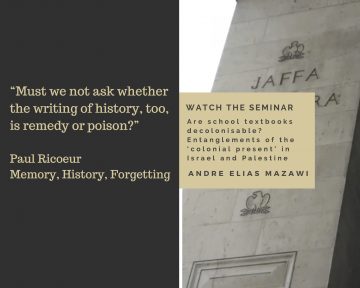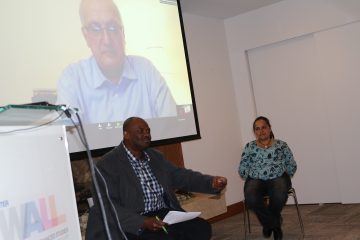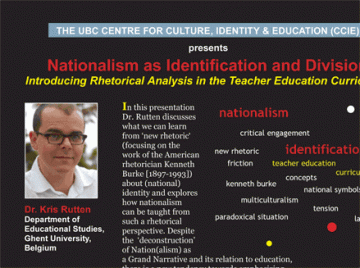Watch: “Decolonizing Higher Education Internationally” (panel)
Decolonizing Higher Education Internationally
“The enduring educational challenges of setting horizons of hope beyond modern-colonial imaginaries” by Vanessa de Oliveira Andreotti (UBC)
“What Does it Take to Decolonize Palestinian Higher Education? ” by André Elias Mazawi
“Youth Activism and Academia as Public Sphere” by Handel Kashope Wright.
Watch: We Too Are “ IDLE NO MORE”: Panel 3 – Education
We Too Are “ IDLE NO MORE”: UBC’s Non-Indigenous Scholars and the Politics of Engaging Indigeneity
Panel 3: Education
Chair: Gerald Fallon
Presenters: Cynthia Nicol (Curriculum and Pedagogy), Jeannie Kerr (Educational Studies), and Cash Ahenakew (Educational Studies)
Nationalism as Identification and Division Introducing Rhetorical Analysis in the Teacher Education Curriculum
In this presentation Dr. Kris Rutten discusses what we can learn from ‘new rhetoric‘ (focusing on the work of the American rhetorician Kenneth Burke [1897-1993]) about (national) identity and explores how nationalism can be taught from such a rhetorical perspective. Despite the ‘deconstruction’ of Nation(alism) as a Grand Narrative and its relation to education, there is a new tendency towards emphasizing national identity, caused by trends such as globalization and multiculturalism. In the language and literature teaching curriculum, this paradoxical situation often causes friction for teachers who are very often expected to teach standard language and national literature. Dr. Rutten’s claim is that rhetoric is a possible tool to deal with these tensions in the curriculum. He will focus on the rhetorical construction of Flanders, Belgium, as a case-study and will argue that Burke’s concepts are useful tools to make students ‘symbol-wise’: to understand the way national symbols work, and to develop critical engagement with, as well as on behalf of, those symbols.



